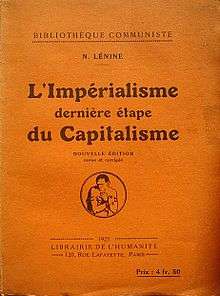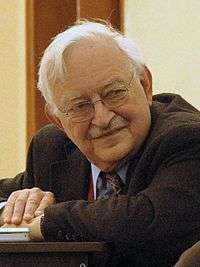Imperialism, the Highest Stage of Capitalism
 | |
| Author | Vladimir Lenin |
|---|---|
| Original title | Империализм как высшая стадия капитализма |
| Country | Russian Republic |
| Language | Russian |
| Genre | Social criticism |
| Published |
1917 Zhizn' i znanie (written 1916) |
Imperialism, the Highest Stage of Capitalism (1917), by Vladimir Lenin, describes the function of financial capital in generating profits from imperialist colonialism, as the final stage of capitalist development to ensure greater profits. The essay is a synthesis of Lenin’s modifications and developments of economic theories that Karl Marx formulated in Das Kapital (1867).[1]
Summary
In his Prefaces, Lenin states that the First World War was “an annexationist, predatory, plunderous war”[2] among empires, whose historical and economic background must be studied "to understand and appraise modern war and modern politics".[3]
In order for capitalism to generate greater profits than the home market can yield, the merging of banks and industrial cartels produces finance capitalism—the exportation and investment of capital to countries with underdeveloped economies. In turn, such financial behaviour leads to the division of the world among monopolist business companies and the great powers. Moreover, in the course of colonizing undeveloped countries, Business and Government eventually will engage in geopolitical conflict over the economic exploitation of large portions of the geographic world and its populaces. Therefore, imperialism is the highest (advanced) stage of capitalism, requiring monopolies (of labour and natural-resource exploitation) and the exportation of finance capital (rather than goods) to sustain colonialism, which is an integral function of said economic model.[4][5] Furthermore, in the capitalist homeland, the super-profits yielded by the colonial exploitation of a people and their economy, permit businessmen to bribe native politicians, labour leaders and the labour aristocracy (upper stratum of the working class) to politically thwart worker revolt (labour strike).
Theoretical development
Lenin’s socio–political analysis of empire as the ultimate stage of capitalism derived from Imperialism: A Study (1902), by John A. Hobson, an English economist, and Finance Capital (Das Finanzcapital, 1910), by Rudolf Hilferding, an Austrian Marxist, whose synthesis Lenin applied to the new geopolitical circumstances of the First World War (1914–1918), wherein capitalist imperial competition had provoked global war among the German Empire, the British Empire, the French Empire, the Tsarist Russian Empire, and their respective allies.
Three years earlier, in 1914, rival Marxist Karl Kautsky proposed a theory of capitalist coalition, wherein the imperial powers would unite and subsume their nationalist and economic antagonisms to a system of ultra-imperialism, whereby they would jointly effect the colonialist exploitation of the underdeveloped world. Lenin countered Kautsky by proposing that the balance of power among the imperial capitalist states continually changed, thereby disallowing the political unity of ultra-imperialism, and that such instability motivated competition and conflict, rather than co-operation:
Half a century ago, Germany was a miserable, insignificant country, if her capitalist strength is compared with that of the Britain of that time; Japan compared with Russia in the same way. Is it "conceivable that in ten or twenty years’ time the relative strength will have remained unchanged?" It is out of the question.[6][7]
The post–War edition of Imperialism, the Highest Stage of Capitalism (1920) identified the territorially punitive Russo–German Treaty of Brest-Litovsk (1918) and the Allied–German Treaty of Versailles (1919) as proofs that empire and hegemony—not nationalism—were the economic motivations for the First World War.[8] In the preface to the French and German editions of the essay, Lenin proposed that revolt against the capitalist global system would be effected with the "thousand million people" of the colonies and semi-colonies (the system’s weak points), rather than with the urban workers of the industrialised societies of Western Europe.[9] He proposed that revolution would extend to the advanced (industrial) capitalist countries from the underdeveloped countries, such as Tsarist Russia, where he and the Bolsheviks had successfully seized political command of the October Revolution of 1917.[10] In political praxis, Lenin expected to realise the theory of Imperialism, the Highest Stage of Capitalism via the Third International (1919–1943), which he intellectually and politically dominated in the July and August conferences of 1920.[11]
Intellectual influence

The Core–Periphery model of global capitalist exploitation, developed by Lenin in the early 20th century, exerted much intellectual influence upon the World-systems theory, by the social scientist Immanuel Wallerstein, that emphasises world systems of international labour, that divide the world into core countries, semi-periphery countries, and periphery countries. The Core–Periphery model also influenced Dependency theory, whose proponents Raúl Prebisch, Andre Gunder Frank and Fernando Henrique Cardoso, propose that natural resources flow from a periphery of poor and underdeveloped countries to a core of wealthy and developed countries, enriching the latter at the expense of the former, because of how the poor countries are integrated to the global economy.[12]
Publication history
In 1916, Lenin wrote Imperialism, the Highest Stage of Capitalism, in Zürich, during the January–June period. The essay was first published by Zhizn i Znaniye (Life and Knowledge) Publishers, Petrograd, in mid 1917. After the First World War, he added a new Preface (6 July 1920) for the French and German editions, which was first published in the Communist International No. 18 (1921).[13]
- Editions
- Владимир Ленин (1917), Империализм, как Высшая Стадия Капитализма, Петроград: Жизнь и Знание.
- Vladimir Lenin (1948), Imperialism, the Highest Stage of Capitalism, London: Lawrence and Wishart.
- Vladimir Lenin (2000), Imperialism, the Highest Stage of Capitalism, with Introduction by Prabhat Patnaik, New Delhi: LeftWord Books
- Vladimir Lenin (2010), Imperialism, the Highest Stage of Capitalism, Penguin Classics.
See also
- Vladimir Lenin bibliography
- Banana republic
- Das Kapital
- Dependency theory
- Exploitation colonialism
- Globalization
- Political economy
- Singer–Prebisch thesis
- Ultra-imperialism
- The Accumulation of Capital: A Contribution to an Economic Explanation of Imperialism (1913), by Rosa Luxemburg
References
- ↑ John Baylis and Steve Smith (2005) The Globalization of World Politics OUP: p. 231
- ↑ “Imperialism and Capitalism” in the Communist International, No. 18, October 1921. p. 3. http://www.fordham.edu/halsall/mod/1916lenin-imperialism.html#bm3.
- ↑ “Imperialism, The Highest Stage of Capitalism Preface April 26, 1917. http://www.fordham.edu/halsall/mod/1916lenin-imperialism.html.
- ↑ Paul Bowles (2007) Capitalism, Pearson: London. pp. 91–93
- ↑ Imperialism the Highest Stage of Capitalism III. Finance Capital and the Financial Oligarchy
- ↑ Alex Callinicos (2009) Imperialism and Global Political Economy. Cambridge: Polity Press. p. 65.
- ↑ Lenin Imperialism: The Highest Stage of Capitalism.
- ↑ Christopher Read (2005) Lenin. London: Routledge. pp. 116–126
- ↑ Vladimir Lenin (2000) Imperialism, the Highest Stage of Capitalism pp. 37–38
- ↑ Christopher Read (2005) Lenin. London: Routledge. pp. 116–126
- ↑ Prabhat Patnaik (2000) "Introduction" to Imperialism: The Highest Stage of Capitalism, by Lenin. New Dehli, Leftword Books. pp. 10–11
- ↑ John Baylis and Steve Smith (2005) The Globalization of World Politics. OUP: pp. 231–235
- ↑ Vladimir Lenin (2000) Imperialism, the Highest Stage of Capitalism, with Introduction by Prabhat Patnaik, New Delhi: LeftWord Books